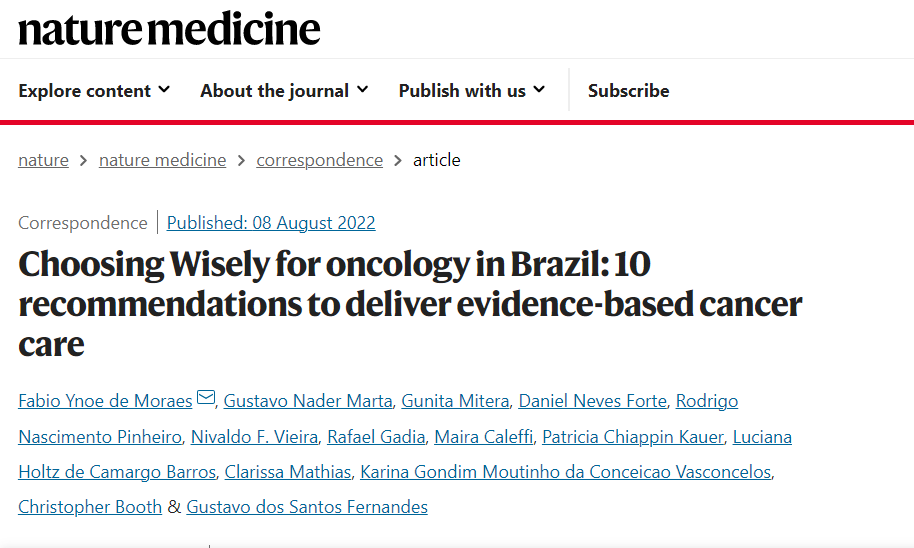Nature Medicine
Fabio Ynoe de Moraes1,2, Gustavo Nader Marta2,3, Gunita Mitera4, Daniel Neves Forte5,6, Rodrigo Nascimento Pinheiro 7,8, Nivaldo F. Vieira9, Rafael Gadia3, Maira Caleffi10, Patricia Chiappin Kauer11, Luciana Holtz de Camargo Barros12, Clarissa Mathias13, Karina Gondim Moutinho da Conceicao Vasconcelos14, Christopher Booth1,15 and Gustavo dos Santos Fernandes16
08 August 2022
Executive Summary by:
Joaquim Cardoso MSc.
Health Transformation Movement
Cancer Management Institute
September 2, 2022
What is the problem?
- The rise in cancer cases is increasing the pressure on the public health system, on which around 80% of Brazilians rely.
- There is therefore a strong need to support evidence- and value-based cancer management, capacity building for services and an investment in the development of a robust cancer workforce.
- However, initiatives such as CW oncology are frequently lacking in the Latin America context.
What is one solution?
- The Choosing Wisely (CW) Brazil oncology task force is a planned initiative based on the success of previous CW oncology exercises in other regions, which each aimed to identify low-value, unnecessary or harmful cancer services that are frequently used
- The current initiative is a regional CW movement toward promoting evidence- and value-based practices in oncology that will translate into more sustainable and efficient health care
How was the approach?
- The team hypothesize that many common medical practices in oncology in Brazil do not offer benefits to patients and hurt the healthcare budget.
- The team therefore aimed to identify a list of cancer practices that are frequently used in the Brazilian healthcare system that are considered of low value, unnecessary or harmful to patients.
- The team also aimed to provide a list of recommendations as a regional benchmark to combat these sets of practices and to create momentum for value- and evidence-based oncology across Latin America.
Box 1 | Choosing Wisely guiding principles
- 1.Evidence of low value or risk of harm
- 2. High frequency of use
- 3. Cost (including opportunity cost)
- 4. Clarity on the wording of the practice item
- 5. Relevance to the Brazilian cancer context
- 6. Feasibility of measuring implementation and success
For more details, and for the content of Table 1, which shows the top 10 recommendations from the CW Brazil oncology project, see the full version of the paper, below.
ORIGINAL PUBLICATION (full version)
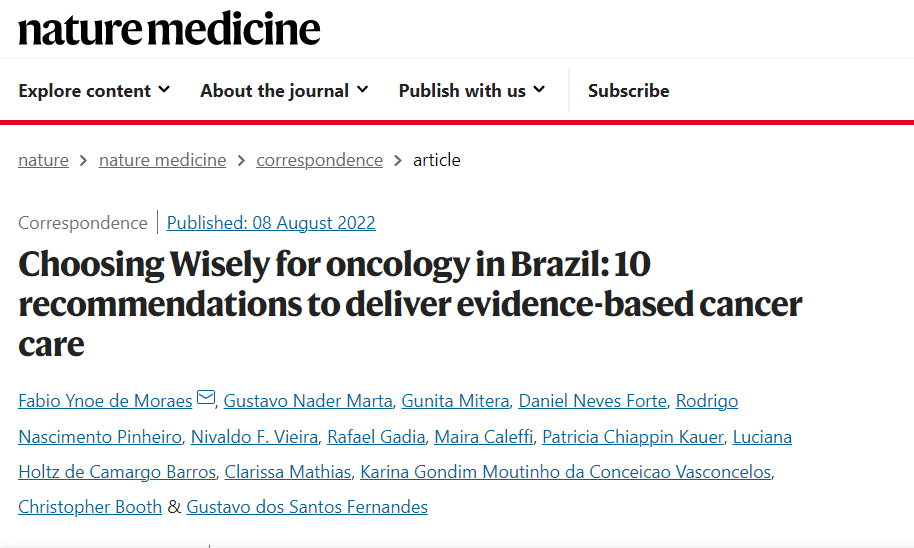
Choosing Wisely for oncology in Brazil: 10 recommendations to deliver evidence-based cancer care
Nature Medicine
Fabio Ynoe de Moraes1,2, Gustavo Nader Marta2,3, Gunita Mitera4, Daniel Neves Forte5,6, Rodrigo Nascimento Pinheiro 7,8, Nivaldo F. Vieira9, Rafael Gadia3, Maira Caleffi10, Patricia Chiappin Kauer11, Luciana Holtz de Camargo Barros12, Clarissa Mathias13, Karina Gondim Moutinho da Conceicao Vasconcelos14, Christopher Booth1,15 and Gustavo dos Santos Fernandes16
08 August 2022
Brazil is the largest country in South America and has a high incidence of cancer.
There were an estimated 625,000 new cancer cases in 2020, representing a 17% increase compared to 2012, when there were approximately 518,000 cases[1].
The rise in cancer cases is increasing the pressure on the public health system, on which around 80% of Brazilians rely.
There is therefore a strong need to support evidence- and value-based cancer management, capacity building for services and an investment in the development of a robust cancer workforce.
The Choosing Wisely (CW) Brazil oncology task force is a planned initiative based on the success of previous CW oncology exercises in other regions, which each aimed to identify low-value, unnecessary or harmful cancer services that are frequently used[2] [3] [4] [5].
CW is a medical-specialty-driven initiative to stimulate dialogue between physicians, patients, advocates and policymakers about ways to promote high-quality and affordable cancer care while avoiding the use of unnecessary tests, procedures and treatments.
However, initiatives such as CW oncology are frequently lacking in the Latin America context.
The current initiative is a regional CW movement toward promoting evidence- and value-based practices in oncology that will translate into more sustainable and efficient health care[6] [7].
During the past decade, cancer treatment has become increasingly complex, with considerable health and economic impacts on all countries[8] [9].
It is well recognized that many common medical practices do not offer benefits to patients, have a negative effect on the healthcare budget and can overload physicians.
Brazil has additional challenges, with highly diverse regional contexts across a total population of 213 million people, fragmented health systems between academic and non-academic health services centers, and diverse public and private reimbursement programs[10].
In general, barriers preventing access to oncology services and a lack of infrastructure for treatment delivery are likely contributing factors to a disproportionately high burden of cancer in low- and low-middle-income countries (LMICs), where the mortality-to-incidence ratio is double that in high-income countries[11].

We hypothesize that many common medical practices in oncology in Brazil do not offer benefits to patients and hurt the healthcare budget.
We therefore aimed to identify a list of cancer practices that are frequently used in the Brazilian healthcare system that are considered of low value, unnecessary or harmful to patients.
We also aimed to provide a list of recommendations as a regional benchmark to combat these sets of practices and to create momentum for value- and evidence-based oncology across Latin America.
Box 1 | Choosing Wisely guiding principles
- 1.Evidence of low value or risk of harm
- 2. High frequency of use
- 3. Cost (including opportunity cost)
- 4. Clarity on the wording of the practice item
- 5. Relevance to the Brazilian cancer context
- 6. Feasibility of measuring implementation and success
The CW Brazil oncology task force was assembled in 2021 and included representatives from national patient and patient advocacy organizations and members from each of the primary oncology specialties of medical, surgical and radiation oncology and palliative care.
The task force also included executive office holders from the three oncology specialty associations of Brazil.
The task force was supported with methodological expertise from non-voting advisers[12] [13] [14] [15].
A full description of the CW methodology is available from previous published initiatives[16] [17].
The final list development included a modified Delphi process and three teleconferences following the six CW guiding principles (Box 1).
Table 1 shows the top 10 recommendations from the CW Brazil oncology project, which includes recommendations that pertain to treatment or palliative care (six practices), screening or prevention (three practices) and diagnosis (one practice).
Although seven of the 10 recommendations were adapted from other international CW lists, the Brazilian project added three new low-value practices:
· neglecting the importance of lifestyle factors;
· overuse of routine chronic disease screening; and
· not treating patients with inoperable early-stage non-small-cell lung cancer, or multiple comorbidities, without first holding a multidisciplinary discussion.
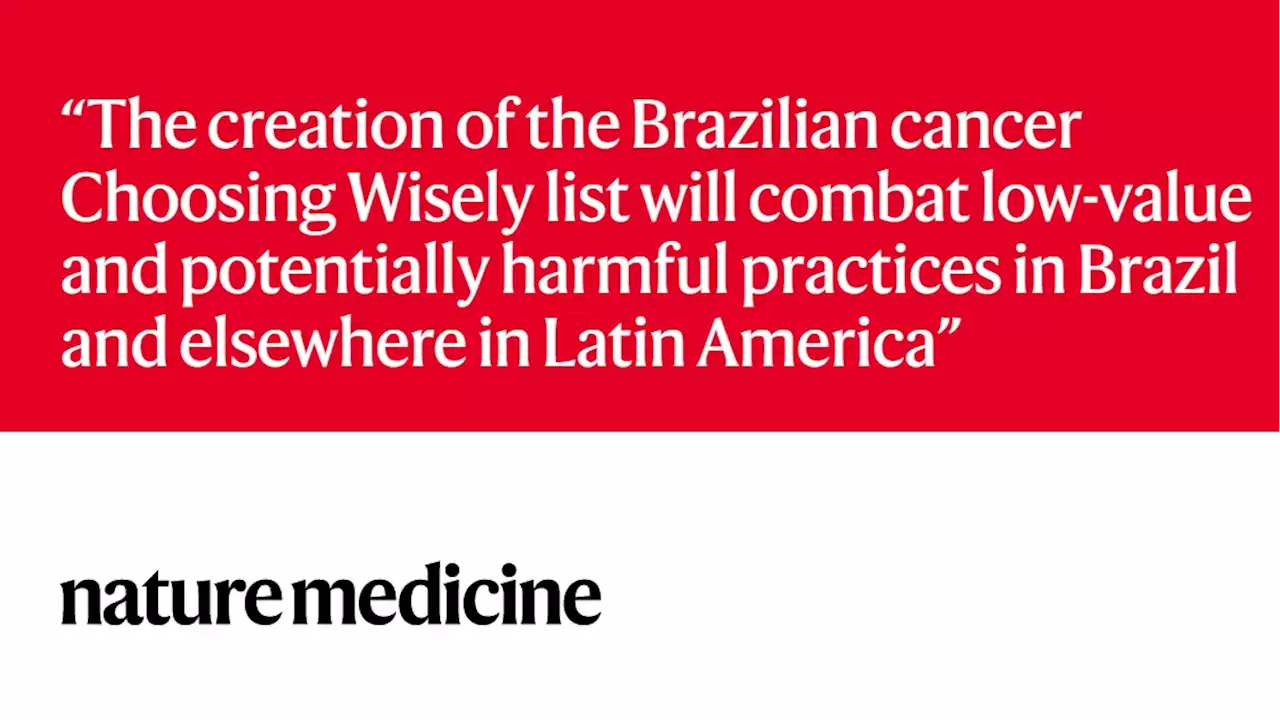
Table 1 | Top 10 recommendations from the Choosing Wisely Brazil oncology task force

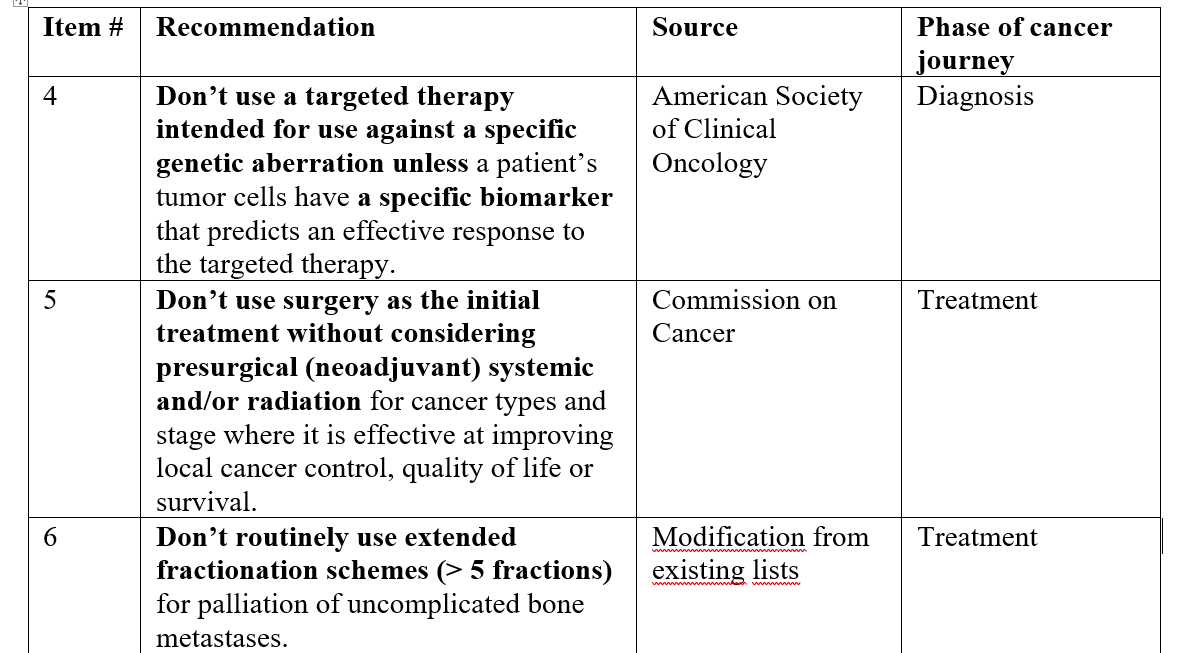
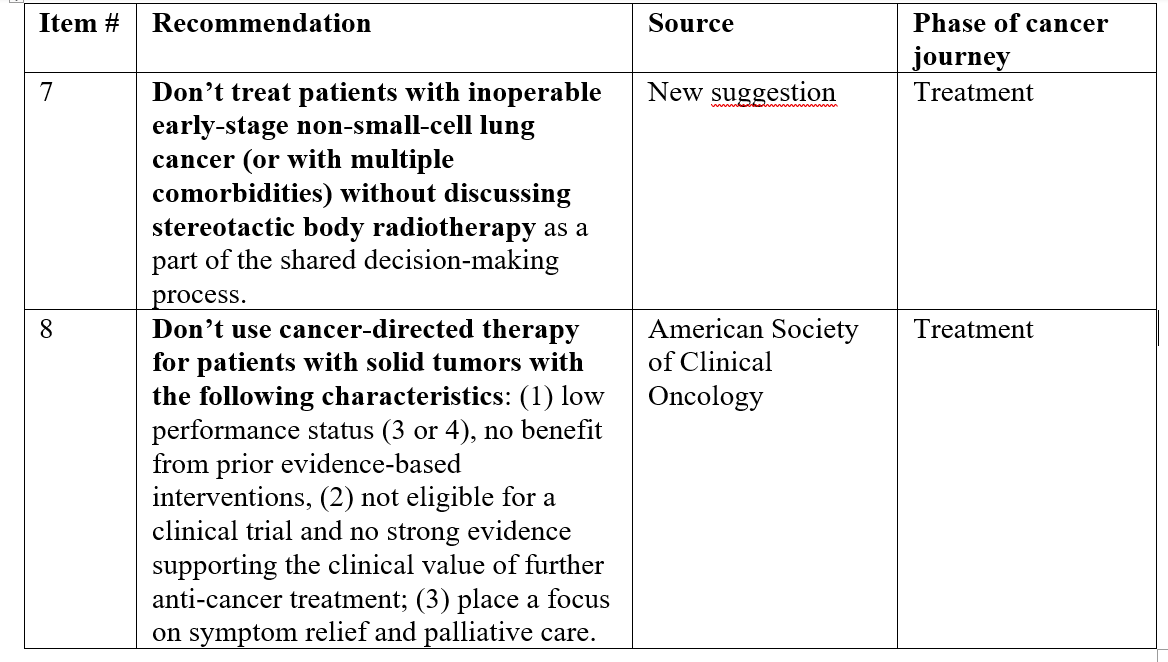
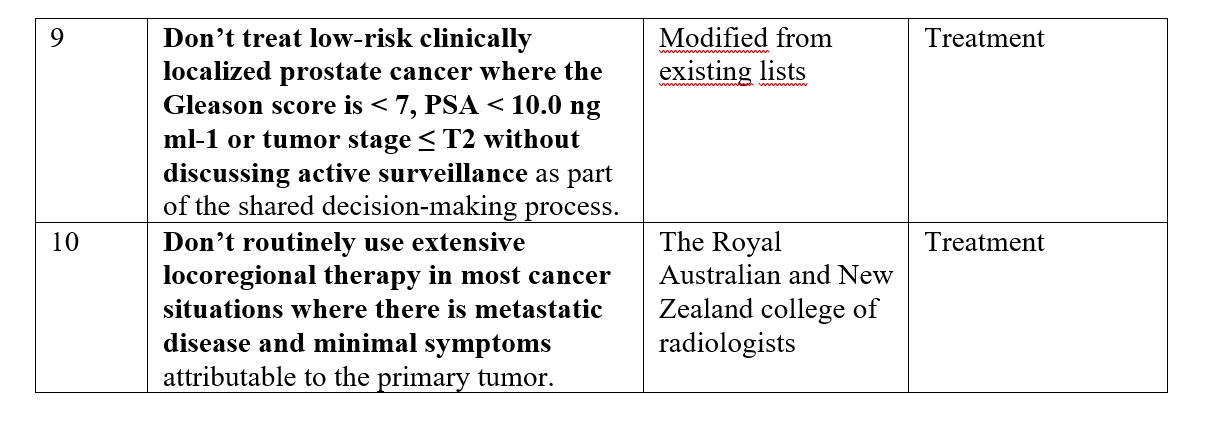
The creation of the Brazilian cancer CW list is the first step of a multi-phase process to combat low-value and potentially harmful practices in Brazil and elsewhere in Latin America.

Next steps:
The next steps will be to undertake a national survey study to describe the available infrastructure and gaps; barriers for high-value patient care; concordance with CW recommendations in routine practice; and barriers to implementation.
We also plan to expand CW implementation and value-based care and to promote CW principles in Brazil and Latin America.
The CW Brazil oncology task force was able to connect and build strong bonds between the different major stakeholders in cancer care.
A number of important recommendations from other CW lists were not included on this top 10 list, which does not mean that they have no relevance in Brazil; rather, the list reflects the most common recommendations for the Brazilian health system.
The development of this final list is the first step toward further development of evidence-value-based oncology in Brazil where patient-centered approach and shared decision-making are promoted.
We hope that this effort inspires further national and regional initiatives in oncology and beyond.
About the authors & affiliations:
Fabio Ynoe de Moraes 1,2,
Gustavo Nader Marta 2,3,
Gunita Mitera 4 ,
Daniel Neves Forte 5,6,
Rodrigo Nascimento Pinheiro 7,8,
Nivaldo F. Vieira 9,
Rafael Gadia 3,
Maira Caleffi 10,
Patricia Chiappin Kauer 11,
Luciana Holtz de Camargo Barros 12,
Clarissa Mathias 13,
Karina Gondim Moutinho da Conceicao Vasconcelos 14,
Christopher Booth 1,15 and
Gustavo dos Santos Fernandes 16
1Department of Oncology, Queen’s University, Kingston, ON, Canada.
2Latin American Cooperative Oncology Group (LACOG), Porto Alegre, Brazil. 3Department of Radiation Oncology, Hospital Sírio-Libanês, São Paulo/Brasília, Brazil.
4University of Toronto, Toronto, ON, Canada.
5Palliative Care Program, Hospital Sírio-Libanês, Sao Paulo, Brazil.
6Medical Emergencies ICU, Hospital das Clínicas, Sao Paulo University, São Paulo, Brazil.
7Vice President (2021–2023), Brazilian Society of Surgical Oncology, Rio de Janeiro, Brazil.
8Surgical Oncology Residency at Hospital de Base, Distrito Federal, Brazil. 9Clínica AMO, Salvador, Brazil.
10Hospital Moinhos de Vento Porto Alegre, Porto Alegre, Brazil.
11Instituto da Mama do Rio Grande do Sul (IMAMA), Porto Alegre, Brazil. 12Instituto Oncoguia, São Paulo, Brazil.
13Oncoclinicas Bahia, Salvador, Brazil.
14Rede D’OR São Luiz Group/Radiotherapy ICESP, Sao Paulo University, São Paulo, Brazil.
15Division of Cancer Care and Epidemiology, Cancer Research Institute at Queen’s University, Kingston, ON, Canada.
16Diagnostic America (DASA), São Paulo, Brazil.
Related Articles




